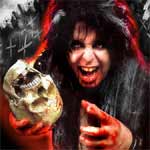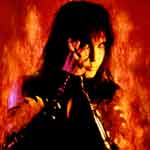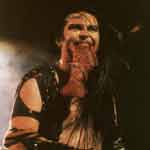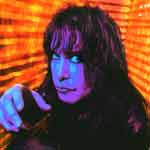| Welcome to the LOUDEST DOT COM ON THE PLANET! | |
 |

|
| Welcome to the LOUDEST DOT COM ON THE PLANET! | |
 |

|
Sleeping In The Fire: KNAC.COM Exclusive Interview with Blackie Lawless (Part I) By Jeff Kerby, Contributor Wednesday, June 5, 2002 @ 10:59 AM
BLACKIE: Well, the first thing that comes to my mind is this: there is a fan base that is directly related to the band as it first came out. You know, there are those who have been with us since the first three or four albums, but since I did Crimson Idol ten years ago, things have been different. We have what I refer to now as regular WASP fans, and then you also have your Crimson Idol people. KNAC.COM: Does it seem strange to have a fan base that is segmented in that way?
BLACKIE: Probably a lot. The first thing that comes to my mind when you say that is a comment that Phil Everlyís dad once told me, he said, ďSon, let me give you a piece of advice, whatever you do, make sure youíre the singer.Ē I just wrote that one down. I think probably the reason that as a singer people are going to identify with you is because the voice is the most human of all the instruments -- thatís whatís  making the direct communication with the majority of the people. On the other hand, in order for it to work, the singer has to be willing to open himself up emotionally because if you donít, theyíre never gonna feel like they know you. If youíre gonna take the audience on a life long ride, youíve got to allow them to become intimate with you. If theyíre not intimate, theyíre never gonna know you. If you look at WASP records and you open them up, youíll see that I usually do pretty extensive liner notes, the reason that I do that is because the lyrics are a direct door. Itís me opening up to the people going, ďCímon in, the record is happening inside here. Come in and watch it take place.Ē You know, Iím a fan, and whenever I see a band willing to do something like that, I just go crazy. It allows me in to become a part of the creative process. They invite me into their world.
KNAC.COM: So given that, would it be fair to say that the lead singer is taking more of a risk than the guitarist, bass player or the drummer -- especially if heís the one doing the writing?
making the direct communication with the majority of the people. On the other hand, in order for it to work, the singer has to be willing to open himself up emotionally because if you donít, theyíre never gonna feel like they know you. If youíre gonna take the audience on a life long ride, youíve got to allow them to become intimate with you. If theyíre not intimate, theyíre never gonna know you. If you look at WASP records and you open them up, youíll see that I usually do pretty extensive liner notes, the reason that I do that is because the lyrics are a direct door. Itís me opening up to the people going, ďCímon in, the record is happening inside here. Come in and watch it take place.Ē You know, Iím a fan, and whenever I see a band willing to do something like that, I just go crazy. It allows me in to become a part of the creative process. They invite me into their world.
KNAC.COM: So given that, would it be fair to say that the lead singer is taking more of a risk than the guitarist, bass player or the drummer -- especially if heís the one doing the writing? BLACKIE: Yeah well, it depends more on whoís writing the lyrics. If you look at a guy like Neil Peart from Rush and, from what I understand, he does most of the lyrics. Somebody, and it doesnít necessarily matter whether itís the singer or not, needs to open the door emotionally. KNAC.COM: But when itís the singer, doesnít it make the connection that much more powerful? Does it matter if an individual is singing his own lyrics versus the drummerís or the bass playerís? BLACKIE: No, I think the truth is the most important thing, and I donít think it matters where it comes from. Thatís one of the things about rock and roll, and itís also the reason itís been attacked by so many religious organizations and politicians is that when rock is in its purest, truest form, it is brutally honest. It is painfully truthful -- as long as thereís truth in it, I donít care where it comes from. KNAC.COM: Since you brought up religious opposition, would you say that you have more animosity built up toward religion itself or more toward the influential leaders of the church whose interpretation of the Bible has affected you?
BLACKIE: Are you kidding me? It was like the weight of the world had been lifted off me because once you realize that maybe itís not God, it starts to give you hope again. I had a Bible with bullet holes on it last tour and put rosary beads on it -- actually, thereís even a song I do on the new one called ďBlack Bone Torso,Ē which is really directed at the church again and how theyíve been harboring child molesters all this time. This isnít a new thing. This has been going on for centuries. Itís just finally starting to come to light now. I mean, these organizations are cults. I donít care whether theyíre Catholics or Mormons or whoever they are -- they are gigantic cults. I donít want to attack anyoneís individual faith, but when you get into cults, they manipulate their people. Thatís where itís dangerous. Itís no different for a government who manipulates their people through the media or whatever. Itís all about crowd control.  KNAC.COM: How much of it do you think promotes close mindedness and a lack of individuality?
KNAC.COM: How much of it do you think promotes close mindedness and a lack of individuality? BLACKIE: A hundred percent of it. KNAC.COM: That being said, thereís a lyric from ďMy Wicked HeartĒ off the new one which goes, ďO God Jehovah, Iíve never known religion.Ē It almost sounds like you lament that to a certain extent. BLACKIE: Caught that did ya? Thatís me talking to God. What Iím saying is that Iíve never known it in the truest sense. In other words, everything Iíve been taught early on, I wouldnít say is a lie, but it was severely distorted. I applaud you for catching that. KNAC.COM: Itís interesting because Iíve read certain interviews that youíve done where you profess that rock and roll is more than music -- that itís a lifestyle. In that lifestyle there is a large degree of hedonism and behavior that would traditionally be thought of as sin in every sense of the word. Then, I read a lyric like that and wonder if there isnít some type of duality going on there.
BLACKIE: Bingo. You become far more selective. You win the washer and dryer. KNAC.COM: Hell, Iíd take fifty cents for the Laundromat -- but isnít this all just part of a normal maturation process, not just for a musician, but for people in general? BLACKIE: Some people get it sooner than others, and for some people, it takes a lifetime. Letís go back to the Bible when Solomon, whoís supposed to be the wisest guy who ever lived, and he says, ďall these things have I pondered,Ē in other words, Iíve thought about it all, and I canít figure it out. KNAC.COM: So basically, you get to the point where itís ok to not know everything--- BLACKIE: Yeah, thatís what the trip is all about. Youíve got to try to put pieces together along the way. KNAC.COM: Does that mean that Blackie Lawless of today is vastly different from the Blackie Lawless of ten years ago?  BLACKIE: I wouldnít say that. I prefer to look at the word ďchangeĒ and that fact that many people believe that in order to achieve it, you have to give something up. I like to look at it though as you just add on to whoever you are. In other words, Iím just trying to add on to who I am. Donít get me wrong, the guy who gets up on that stage -- you wanna talk about duality, itís definitely there. One of the reasons why Chris [Holmes] and I hooked up is that we were such extreme personalities. We had the ability to be the nicest people youíd ever want to meet, but cross us and we could turn into the devil himself. There was just a wide range of emotions going on there, but probably artists in general are like that. They just have a wide emotional swing.
KNAC.COM: Thatís interesting, because you placed an acoustic version of ďHallowed GroundĒ on the new disc because you wanted to take some of the layers off of the song and allow the lyrics to stand out more prominently. Is there ever a part of you that sits at home and goes, ďIím Blackie Lawless, Iím the lead singer of WASP, but you know, it would be kind of cool if I could come out with an acoustic album, only I wouldnít be Blackie anymore, and there wouldnít be all these preconceived notions about my music. I could just write some songs and have them stand on their ownÖĒ Have you ever thought that?
BLACKIE: I wouldnít say that. I prefer to look at the word ďchangeĒ and that fact that many people believe that in order to achieve it, you have to give something up. I like to look at it though as you just add on to whoever you are. In other words, Iím just trying to add on to who I am. Donít get me wrong, the guy who gets up on that stage -- you wanna talk about duality, itís definitely there. One of the reasons why Chris [Holmes] and I hooked up is that we were such extreme personalities. We had the ability to be the nicest people youíd ever want to meet, but cross us and we could turn into the devil himself. There was just a wide range of emotions going on there, but probably artists in general are like that. They just have a wide emotional swing.
KNAC.COM: Thatís interesting, because you placed an acoustic version of ďHallowed GroundĒ on the new disc because you wanted to take some of the layers off of the song and allow the lyrics to stand out more prominently. Is there ever a part of you that sits at home and goes, ďIím Blackie Lawless, Iím the lead singer of WASP, but you know, it would be kind of cool if I could come out with an acoustic album, only I wouldnít be Blackie anymore, and there wouldnít be all these preconceived notions about my music. I could just write some songs and have them stand on their ownÖĒ Have you ever thought that? BLACKIE: I could answer your question simply, but thatís not fair. I would have a tendency to think that the majority of the guys who have done what Iím doing, who are genuinely talented, probably feel that way. Because, if you look at Ozzy -- Ozzy as a singer -- irregardless of what you see on the TV and the dysfunctionality -- let me tell you something about him as a singer: he is phenomenal. Not just as a singer either, but his ability to create melody. I mean, I hear Beatles stuff running through and through and through him. Thatís not just something you can emulate either, youíve got to have that inside of you. I hear it coming out in his singles more and more as heís getting older. Heís starting to expose more and more of it all the time, I donít think itís an accident. So, like I said, I think that to answer your question simply, yeah, itís not really fair. Anybody whoís any good -- really good -- has probably got the ability to do a lot of things. What youíre asking me is like whether actors like to be typecast, and no, they donít. KNAC.COM: And the fans can be unforgivingÖ.
 BLACKIE: I donít know if anything does qualify me other than the fact that, like I said before, truth is the most important thing. If we are going to attempt to be truthful, we should do it to the best of our abilities. Thatís not to say that you have to do it all the time, because there are times in rock and roll, like we did with Helldorado, where you just let your hair down and let it all hang out. You know, itís a time where you get tired of standing on your soap box, and you just have to do something for yourself for awhile. I think there is a time and place for all of that. Truth be known, when I write about something, that was the truth at the moment. Thatís a sensitive question because you ask me what gives me the right or the authorization to say these types of things and my answer is, nothing and everything. You know, because I think youíve got to do what you feel compelled to do and whatís moving you most at the moment. Thereís a line in the liner notes which says that this new disc is basically Ďmusic to go and kill people by.í I gotta tell you, and I know it doesnít sound very rock and roll, but I thought long and hard about whether or not that was really the statement that I wanted to make. I must have come close a dozen times to yanking that out of the liner notes, but the reason I didnít is that every time I would get close to doing it, I would come up with a lot of reasons why I had to do it. I just felt really compelled to make that statement at that time. I came up with this thing afterwards, I was like, ďFuck political correctness, that went down with the World Trade Centers.Ē When I came up with that little catch phrase, it justified everything inside my head because thatís really what I was feeling.
KNAC.COM: So basically, what youíre saying is that the truth of the moment has to supercede a more calculated, formulaic approach---
BLACKIE: I donít know if anything does qualify me other than the fact that, like I said before, truth is the most important thing. If we are going to attempt to be truthful, we should do it to the best of our abilities. Thatís not to say that you have to do it all the time, because there are times in rock and roll, like we did with Helldorado, where you just let your hair down and let it all hang out. You know, itís a time where you get tired of standing on your soap box, and you just have to do something for yourself for awhile. I think there is a time and place for all of that. Truth be known, when I write about something, that was the truth at the moment. Thatís a sensitive question because you ask me what gives me the right or the authorization to say these types of things and my answer is, nothing and everything. You know, because I think youíve got to do what you feel compelled to do and whatís moving you most at the moment. Thereís a line in the liner notes which says that this new disc is basically Ďmusic to go and kill people by.í I gotta tell you, and I know it doesnít sound very rock and roll, but I thought long and hard about whether or not that was really the statement that I wanted to make. I must have come close a dozen times to yanking that out of the liner notes, but the reason I didnít is that every time I would get close to doing it, I would come up with a lot of reasons why I had to do it. I just felt really compelled to make that statement at that time. I came up with this thing afterwards, I was like, ďFuck political correctness, that went down with the World Trade Centers.Ē When I came up with that little catch phrase, it justified everything inside my head because thatís really what I was feeling.
KNAC.COM: So basically, what youíre saying is that the truth of the moment has to supercede a more calculated, formulaic approach---
BLACKIE: It was just imagery. I had studied the occult when I left the church, and I was pretty heavy into it for about three years, butÖ that song really got the attention of one of the guys who worked with us on the first album, Mike Varney. He wanted to know if that song was about the occult. Mike was religious in his own way and really didnít want to do it if it was about that. I told him that it wasnít and that it was just about imagery. I was just trying to create a flavor in peoplesí heads and leave it open enough to allow for interpretation. KNAC.COM: It is interesting to hear that song, and it is really easy to fixate on the lyrics because there isnít this wall of sound accompanying it. BLACKIE: In the bedroom I had in the place I was living, I had a bunch of candles and they were lit when I was writing that song. Same thing with ďFuck Like a Beast,Ē I had rented a loft, and when I moved in, there were like old pictures of old Playboys and stuff plastered on the walls of this loft. They were old, they were flaking and they were falling apart. Eventually, we covered it all over, but, you know, when I walked in there, there was the first lyric to the song -- ďIíve got pictures of naked ladies, lying on their beds.Ē Iím just playing musical reporter here. Iím writing whatís in front of me. (Stay tuned for Part II)
| |||||||||||||||||
|
|
| Recent Features |
 |